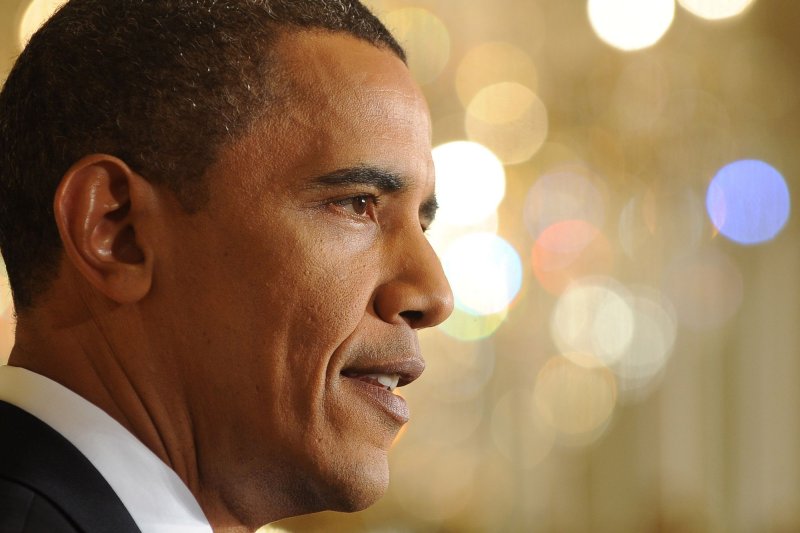U.S. President Barack Obama speaks to the media during a news conference in the East Room of the White House in Washington on May 27, 2010. Most of his remarks and questions from reporters focused on the BP Deepwater Horizon oil spill. UPI/Roger L. Wollenberg |
License Photo
WASHINGTON, May 27 (UPI) -- The United States must strengthen international partnerships and rebuild its own economy to create a strong national security, President Barack Obama said in his first national security plan, which was released Thursday.
The strategy strongly emphasizes looking beyond military might to diplomatic tools and international collaboration to achieve U.S. security objectives.
"Our armed forces will always be a cornerstone of our security but they must be complemented," the official strategy paper says. "Our security also depends upon diplomats who can act in every corner of the world; ... development experts who can strengthen governance and support human dignity; and intelligence and law enforcement that can unravel plots, strengthen justice systems and work seamlessly with other countries."
It stresses the need to strengthen international institutions and build new alliances with countries such as India, Brazil and China.
While acknowledging the shortcomings of international bodies, Obama told graduating cadets at West Point last week that "America has not succeeded by stepping out of the currents of cooperation."
Secretary of State Hillary Clinton embraced the increased confidence in diplomacy. "We are no less powerful but we need to apply our power in different ways," she said Thursday.
That Obama would place such an emphasis on diplomatic power isn't surprising -- he has attempted this approach on other occasions during his 16 months in office. It does, however, posit that the U.S. military is no longer alone is the driving force of American policy abroad.
Congress mandates that each administration, within five months of inauguration, develop a national security strategy and update it annually, though that often isn't followed in practice. The Bush administration released two such strategies, in 2002 and 2006.
Obama's strategy departs significantly from the previous administration in tone as well as substance.
John Brennan, Obama adviser on homeland security and counter-terrorism, criticized the notion that the United States is engaged in what President George W. Bush called a war on terrorism. "Our enemy is not 'terrorism' because terrorism is but a tactic," Brennan said. "Our enemy is not 'terror' because terror is a state of mind and as Americans we refuse to live in fear."
"Our enemy is al-Qaida and its terrorist affiliates," he said, noting that calling U.S. enemies "jihadists" or "Islamists" is counterproductive.
In what could be seen as a jab at the Bush administration, the Obama strategy emphasizes universal human rights. The Bush administration was criticized for rejecting international standards in regard to the prisoners held at Guantanamo Bay. The new strategy diverges from the notion of pre-emptive war Bush outlined in his 2002 strategy and reiterates Obama's promise to close the Guantanamo prison.
But despite the shift, Obama will build on elements of the Bush administration's national security framework. Bush's 2006 strategy, for example, acknowledged the need for international cooperation. "Recognizing the limits to what even a nation as powerful as the United States can achieve by itself," it read. "America cannot know peace, security, and prosperity by retreating from the world."
Juan Zarate, who was Bush's deputy national security adviser for combating terrorism, said that administration's efforts to work with international partners on issues such as nuclear nonproliferation are often overlooked.
"Though we may want a multilateral or multi-polar international security environment, the reality is that the international community still relies on American leadership -- which often may look like unilateralism but is really undertaken in a less traditional multilateral context," Zarate said.
Balancing a unilateral with a multilateral approach poses a challenge for the United States because other major international players often are reluctant to step up to the plate, Zarate said.
"We're struggling as a country to determine how to drive global solutions without being the world's police or the world's ambulance," he said.
--
Focus on innovation in America
Obama's strategy also stresses that the foundations of security have to be built at home through economic expansion as well as investments in education, science and technology.
"Our strategy starts by recognizing that our strength and influence abroad begins with the steps we take at home," Obama said in his opening letter to the document. "Simply put, we must see American innovation as a foundation of American power."
Strengthening the economy falls in line with legislation pushed by the administration, such as the American Recovery and Reinvestment Act that pumped $787 billion into the American economy.
Obama made clear that the United States must look beyond the current wars to the world it wants to create.
"To get there, we must pursue a strategy of national renewal and global leadership -- a strategy that rebuilds the foundation of American strength and influence," Obama said.





